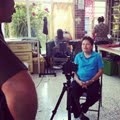(excuse the tiny, dodgy photo, I’m limited by technology in a far flung place).
Today I woke up in the most violent country in Latin America, and not long after breakfast there was a blast of gunfire nearby (or maybe it was just an early morning fireworks display, mum).
But I spent the day in a place known as ‘the refuge’ where flocks of bright green parrots whizzed (and shrieked) overhead, and children of all ages played together in a beautiful garden. Where another kind of life felt possible.
We spent the day with Pamela Leon, a relaxed Guatemalan lawyer in a turquoise polo shirt, who set up the refuge after encountering the horrific injustices and abuses suffered by the victims of domestic violence in her country. Very few of these cases even make it into the country’s legal processes, but the few she saw were enough.
Domestic violence has somehow, heartbreakingly, become an accepted part of Guatemalan culture, as much within the church as outside of it. (And Guatemala boasts the highest numbers of Christians in Central America, outside of the traditional Catholic church. It’s a sidenote to where I’m going, but this just hits me in the guts, how can we offer so hope little to the world?).
I met women today who arrived at the refuge barely recognisable, bruised and swolen from all the blows they had so recently received. There are plenty theories as to why this violence persists, some tracing its normalisation back to the long civil war from 1960 to 1996, and others (including Pamela) believing instead that it began with the violent colonisation of the country in the 16th century. The question that matters, however, is how ‘normal’ gets rewritten in a country’s psyche (or even just a family’s).
It’s not that it’s legal. Guatemala actually has an impressive legal system and a series of laws which protect women. On paper they’re great. If only it led to action. Corruption and machismo combine to mean that women and children are left undefended and unheard, and that men are shown preferential treatment. Pamela shared how when the police are called out by women who have been beaten by their husbands, it isn’t unusual for the police to suggest that they just need to learn to cook better, or make more effort with their appearance.
Pamela’s project is, for a privileged few, making possible the life that the law is supposed to enshrine. She and her tiny staff team are helping these women create a different future. The women come and live at the refuge for a year or so, with their children. In contrast to where they have come from, it is safe and peaceful. The children are able to go to school. The women are given psychological support, a calm environment, friendship, prayer and love. There are small businesses through which they can earn money. They are encouraged to study and to find work. (Today one of them was taking her entrance tests to train as a nurse). If they are prosecuting their aggressors then Pamela takes up their defence and advises them legally. Sadly there are few other lawyers who will defend these women because of how hard it is, and the lack of financial reward.
El Refugio is the only project of its kind in the country. If, miraculously, your situation is taken seriously, then if you’re lucky you’ll end up in a government-run service which offers respite for 48 hours up to a maximum of 3 months. They don’t offer any lasting way out, so your situation probably won’t change in the long-run. Pamela’s project can take 7 women and their children at a time.
It’s a drop in the ocean.
And I know the ocean is made up of many (squillion) drops but it must feel like blowing against the wind.
Pamela is less defeatist, and it’s because she has genuine faith that there is a bigger story than these depressing statistics suggest. She feels called (you’d need to, to undertake such a courageous and dangerous task, especially as a single woman), and says that her part is obedience to that calling. She is not single-handedly responsible for turning the tide, but she will play her part.
And maybe that’s the only way to fight violence: to refuse its tactics, to resolutely live out an alternative, to be patient and compassionate and do what you can, to defend others and create space for their healing and rebirth. It’s not fast (unlike the alternative), but perhaps it grows something that will endure?

